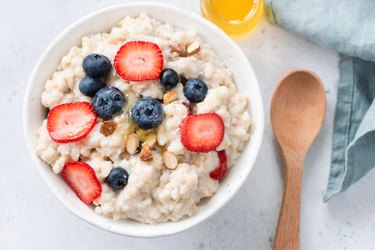
Although there's no specific diet for spleen problems, some research has pointed toward helpful dietary and lifestyle alterations. In the event that you need to have your spleen removed, there are certain dietary recommendations to aid in recovery.
Tip
There are no foods that will directly induce pain with an enlarged spleen, although certain foods may decrease inflammation.
Video of the Day
Enlarged Spleen Overview
You may have heard of the spleen, but do you know where it's located and how it functions? The spleen is a small — about the size of your fist — but essential organ. According to the Mayo Clinic, the spleen is situated below the left side of your rib cage. It's part of the lymphatic system and helps fight infection, while keeping your body fluids in equilibrium. Moreover it destroys old damaged cells, helps your blood clot and fights germs.
Video of the Day
Another article by Mayo Clinic details the features of an enlarged spleen, also known as splenomegaly. In some cases, an enlarged spleen may not cause any symptoms. In other cases, it can cause pain in the left upper abdomen and shoulder, tiredness, anemia, easy bleeding and frequent infections.
There are a number of causes for an enlarged spleen, many of which are temporary. Parasitic infections, blood cancers, metabolic disorders, bacterial and viral infections, a blood clot in the spleen's veins and anemia can contribute to the enlargement of the spleen. If complications arise or the swelling becomes more severe, surgery may be necessary.
According to the National Health Service in the United Kingdom, spleen pain is often felt below the left ribs. If the area is sensitive when touched, it could be the sign of a damaged or enlarged spleen. The food you eat doesn't necessarily directly alleviate spleen pain, though there are certain foods that may regulate enlargement and recommended foods to eat after spleen removal.
Diet for Spleen Problems
A November 2017 review in Critical Reviews in Food Science and Nutrition confirms the role of nutrition in regulating spleen enlargement resulting from non-alcoholic fatty liver disease. The review states that there's evidence that food quality and quantity along with genetics can contribute to low-grade inflammation of the spleen and liver.
Though there aren't many human studies on spleen enlargement and diet, one study with mice in BMC Research published in October 2018 found that a high-fat, high-sugar diet induces a large spleen, which may then be ameliorated with exercise. That's to say that while a bad diet may aggravate an enlarged spleen — sugary, fattening foods are spleen foods to avoid — exercise can relieve it.
Should you reach the point where your spleen must be removed through surgery, called a splenectomy, you will need to adhere to a special diet during recovery. Alberta Health Services recommends eating several small meals during the day for recovery and slowly increasing the amount you eat. If you're experiencing stomach upset after surgery, try bland foods like rice, broiled chicken and toast. Your doctor may also recommend taking iron supplements and hydrating.
When it comes to diet for an enlarged spleen, it's also important to note that one of the symptoms of splenomegaly is the feeling of being full without eating, says Mayo Clinic. What's more, it may cause you to eat only a small amount from the enlarged spleen pressing on your stomach. Remember to continue eating a healthy balanced diet and consult your doctor for dietary advice.
Read more: How to Repair a Fatty Liver
Enlarged Spleen Treatments
According to Victoria, Australia's Better Health Channel, treatment for an enlarged spleen will depend on the underlying cause. Radiation and chemotherapy, for instance, could be used to treat cancers, while thalassaemia requires regular blood transfusions.
In severe cases when the spleen is damaged or diseased, surgery to remove the spleen may be required, says Nidirect. In the instance of removal, the liver will take on several of the spleen's functions. After spleen removal, you can take certain measures to prevent infection, such as getting vaccinated for the flu, meningitis C, Haemophilus influenzae type b and pneumococcal infections.
You can also take antibiotics for the first two years after your spleen is removed if your immune system isn't functioning properly or if you're under the age of 16. Make sure to be on the lookout for post-surgery infection, which might induce symptoms such as sore throat, severe headache, fever, abdominal pain and redness and swelling near the surgical wound.
- BMC Research Notes: "High-Fat, High-Sugar Diet Induces Splenomegaly That Is Ameliorated With Exercise and Genistein Treatment"
- Alberta Health Services: "Splenectomy: What to Expect at Home"
- Critical Reviews in Food Science and Nutrition: "Nutrition, Inflammation and Liver-Spleen Axis"
- Nidirect: "Spleen Problems and Spleen Removal"
- Mayo Clinic: "Enlarged Spleen"
- Better Health Channel: "Splenomegaly"
- National Health Service: "Spleen Problems and Spleen Removal"